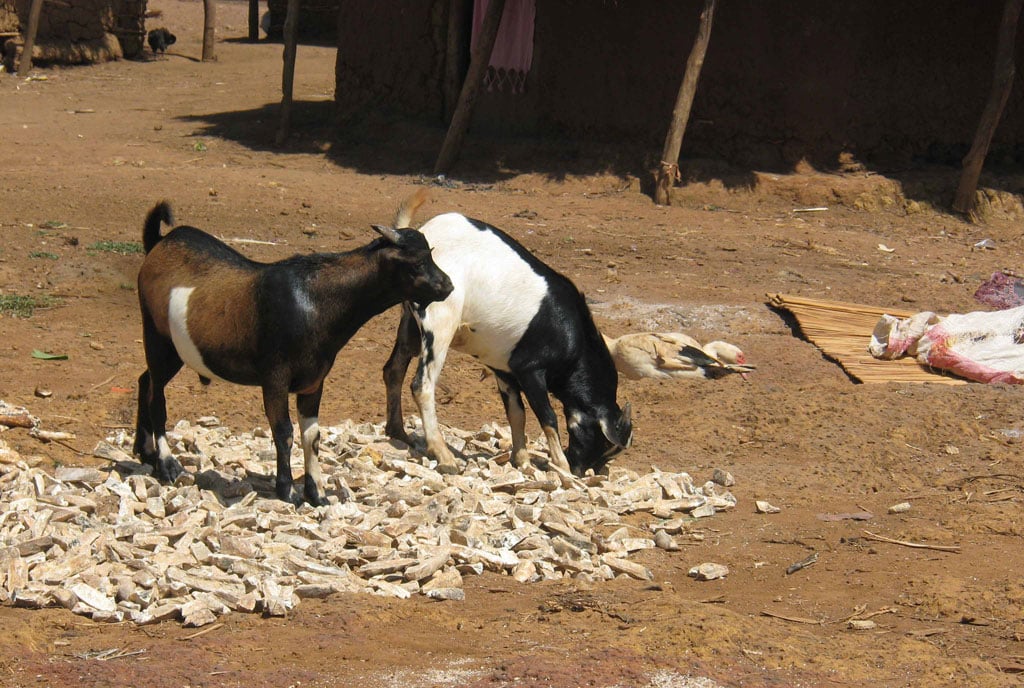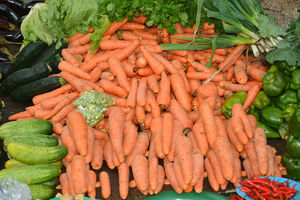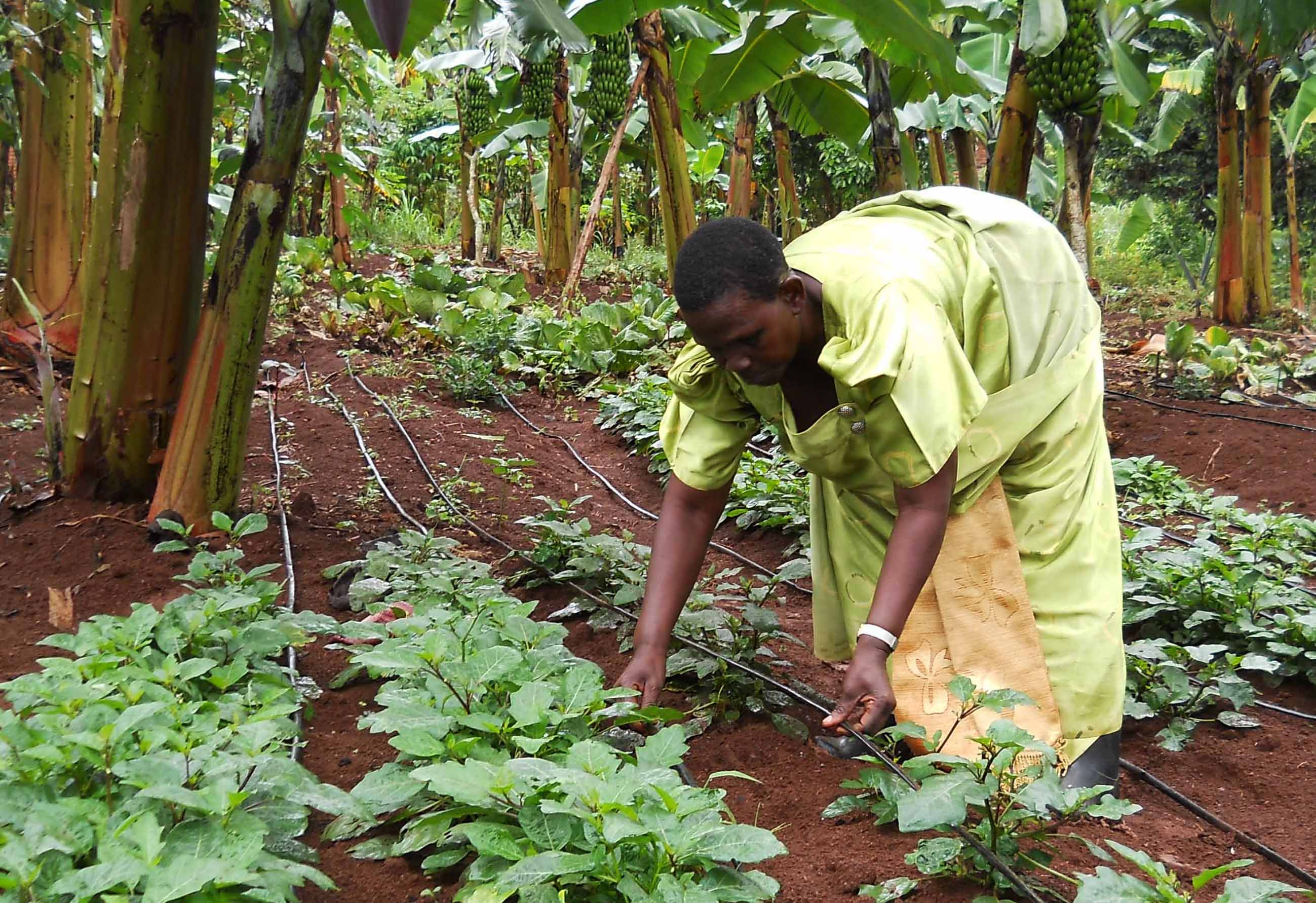
Goats walking over cassava drying in the yard may contaminate the cassava with goats’ droppings. PHOTO/MICHAEL J SSALI
Yesterday the world marked the World Food Safety Day, spearheaded by the World Health Organisation (WHO) and the Food and Agriculture Organisation (FAO).
In Uganda as we reflect on the day’s activities it is important to bear in mind that everybody is a stakeholder in the event since we are all food consumers.
Food safety
The farmers, the traders, and the chefs, as food handlers, must also be concerned about food safety and it is the day for them to think more about the safety of the food that they provide to the consumers.
The day’s slogan was: “Food safety is everyone’s business.” The aim for marking World Food Safety Day is to draw the attention of everyone to the risk of food hazards and to inspire action to help, prevent, detect and manage foodborne risks, contributing to food security, agriculture, market access, tourism, and sustainable development.
“When food is not safe, people cannot consume the nutrients they need to stay healthy to learn or to work,” reads a joint FAO and WHO statement.
“More than 600 million people fall ill and 420,000 die every year after eating contaminated food. These illnesses and these deaths are largely preventable if food safety is prioritized along the food chain from the producer to the consumer. Food safety is a collective responsibility. Everyone from producers to consumers needs to play their part. This is the only way we can be sure the food on your plate will be safe.”
Food safety risks
Are our food handlers in Uganda really aware of the food safety risks and is anything being done to address the food related health risks? Emma Kakooza, a food scientist and specialist in personalised nutrition at Kisa Clinic in Masaka City told Seeds of Gold in an interview, “We have a lot of challenges in this country with regard to food safety in nearly all the different food value chain lines. Take for example quickly perishable food items like vegetables and fruits. They have a lot of moisture and they get bruised quite easily which enables organisms such as molds to gain access into the bruised and nutrient rich parts. The molds lead to the formation of aflatoxins which is a big health risk.”
He says the food items should always be handled with maximum care to avoid bruises. He also suggested proper cleaning and drying of grain as quite preventive “In fact since aflatoxins do exist in the soil the ideal position would be to have the soil tested before planting the crops,” he said.
Kakooza went on to state that due to lack of appropriate processing and storage technologies in the country people are at risk of falling sick due to the food that they eat. “Many of the farmers concentrate more on food crop production without paying attention to health concerns,” he says.
“They use agrochemicals such as herbicides and pesticides without any education about their usage and handling. For example, on average, vegetables or fruits sprayed with pesticides should not be harvested or consumed for at least two weeks but a lot of the farmers don’t know this. Two or three days after spraying the chemicals on the crops they are harvested and taken to the market. They will sell the crop as soon as the buyer comes regardless of when they were sprayed.”
He further said most farmers have transport problems which force them to hire trucks to convey their produce to the market. “It turns out that they use the same trucks that carry manure like cow dung and poultry to carry food items like grain, fruits, and vegetables often without bothering to first clean the trucks. The germs from manure gain access to the food items carried on the truck. Such fruits are often turned into juice for people to consume before they are properly cleaned.”
When items such as fruits and vegetables are purchased by a restaurant owner and put in the refrigerator to remain fresh but the electricity goes off for an extended period which causes deterioration in the condition of the food items, how sure are we that the restaurant owner disposes of the foodstuffs?
Hygiene
Tony Kyambadde, a trained agriculturist and project coordinator, Caritas MADDO Kitovu, a Masaka-based NGO that supports farmers to fight poverty says: “We prioritise high standards of hygiene among our farmers, because disease is a big contributor to poverty. When people are sick they don’t work. They spend money and time going to clinics. They must observe cleanliness and they must produce clean and safe food. Every home must have clean toilet facilities and waste disposal pits. If they must use agrochemicals, they must follow the manufacturers’ guidelines. We teach them that if the chemicals are wrongly applied they kill soil and plant enriching organisms such as snails and bees which are so badly needed in agriculture and so important for environment sustainability.”
He went on to say that Masaka Diocesan Development Organisation (MADDO) emphasises proper drying and storage of grain to avoid pest attack and mold. They are encouraged to use natural pest repellants. “It will take a lot of time to educate all our farmers about food safety related health risks but these are messages that we must keep repeating all the time.”
Dr Paul Kanoonya, retired Masaka District Production Officer, says, “Sick animals treated with veterinary drugs should not be consumed by humans, four to five days following the administration of the drugs. Thorough boiling of the milk or the meat does not eliminate the risk factor of veterinary chemicals getting into the human body.
He further says that in developed countries there are bodies like National Meat Commission and National Milk Board to which all farmers must by law sell their livestock and products like milk and eggs. These employ veterinary doctors whose duty it is to ensure that all livestock food products going to supermarkets and butcheries are well examined and fit for human consumption which is far from being the case here in Uganda.
Unchecked animal products
Dr Kanoonya says another risk of consuming unchecked animal products is contraction of bacterial diseases like anthrax and mastitis. He said mastitis is spread by drinking milk from a cow whose adder is infected with mastitis and that if the milk is not properly boiled it can cause ill health to the consumer. He also mentioned salmonellosis (typhoid) which he said is the most serious disease transmitted to man from eating eggs infected with a bacterium called salmonella.
A research project on Pesticide Use, Health and Environment (PHE) conducted in 2018 by Uganda National Association of Community and Occupational Health (UNACOH) on tomatoes from randomly selected 18 districts of Uganda revealed that, over all, a total of eight different pesticides (Mancozeb, Malathion, Metalaxyl, Profenos, Cypermethrin, Dichlorvos, Chlorpyrifos and Lambda-cyhalothrin) were found in the tomato samples.
“Of concern though was Mancozeb which was found in much higher concentrations than in detectable levels for all the samples (pre-treated and control) from the farm and market,” reads the research report presented by Aggrey Atuhaire, coordinator PHE Project and Dr D.K. Sekimpi, executive director, UNACOH. The tomatoes were subjected to analytical procedure for assessment of pesticide residue levels under the auspices of the Pesticide Residue Laboratory, Directorate of Government Analytical Laboratory, Ministry of Internal Affairs.
Pesticides
The research project reveals that only 12 percent of the tomato farms were found to be mixing the manufacturer recommended rate of about 50 grammes of formulation per 20 litres of water.
The research findings also disclosed that a total of 25 different pesticides were found in different water sources in June of that year.




